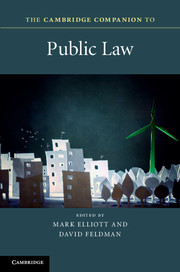Book contents
- Frontmatter
- Contents
- Notes on Contributors
- Introduction
- 1 The distinctiveness of public law
- 2 The politics of public law
- 3 The rule of law in public law
- 4 Legislative supremacy in a multidimensional constitution
- 5 The politics of accountability
- 6 Rights and democracy in UK public law
- 7 Public law values in the common law
- 8 Public law and public laws
- 9 Public law and privatisation
- 10 State architecture: subsidiarity, devolution, federalism and independence
- 11 Soft law never dies
- 12 The impact of public law litigation
- 13 Designing and operating constitutions in global context
- Index
- References
5 - The politics of accountability
Published online by Cambridge University Press: 05 September 2015
- Frontmatter
- Contents
- Notes on Contributors
- Introduction
- 1 The distinctiveness of public law
- 2 The politics of public law
- 3 The rule of law in public law
- 4 Legislative supremacy in a multidimensional constitution
- 5 The politics of accountability
- 6 Rights and democracy in UK public law
- 7 Public law values in the common law
- 8 Public law and public laws
- 9 Public law and privatisation
- 10 State architecture: subsidiarity, devolution, federalism and independence
- 11 Soft law never dies
- 12 The impact of public law litigation
- 13 Designing and operating constitutions in global context
- Index
- References
Summary
Accountability has recently been described as ‘the uber-concept of modern times’. In politics it has certainly become ubiquitous. There are daily demands for someone or something to be ‘held to account’. The routine response to a whole range of political issues is a call for ‘more accountability’. Yet this political usage of the word is relatively recent. What began life as the language of the counting house, as dry as financial dust, has been converted into the stock language of the political and constitutional arena. Even more interestingly, what was once a means by which medieval monarchs could count the assets of their subjects has been transformed into the means whereby modern citizens can hold to account those who rule them.
So pervasive has the language of accountability become – and so synonymous it now is with every desirable attribute of democracy and good government – that the concept is in danger of losing all critical meaning. For example, it would be a very brave politician (or commentator) who would dare to suggest that good governance might even benefit from somewhat less accountability in certain respects. This is not the place to explore all the conceptual complexities of accountability, but it is necessary to pin down a core meaning. It involves a relationship between an account-holder and an account-giver, so that the latter has to provide explanations to the former, with the possibility of consequences. Obviously legal accountability is a ‘hard’ form of accountability, with enforced consequences, but the primary focus here is on the political accountability that is intrinsic to democratic politics and which takes a variety of forms.
It is intrinsic because the idea of democracy carries with it the belief in the popular control of power. This in turn acts to prevent abuse of power and corruption, promotes learning and nourishes legitimacy. Accountability is therefore both the lubricating idea and the practical toolkit that gives effect to the idea. In the case of political accountability, the relationship is usually described as that between principal and agent. The principal is the electorate and the agent is their elected representatives. There then follows a chain of delegation, with ministers accountable to the elected representatives and civil servants accountable to ministers.
- Type
- Chapter
- Information
- The Cambridge Companion to Public Law , pp. 96 - 115Publisher: Cambridge University PressPrint publication year: 2015
References
- 2
- Cited by



